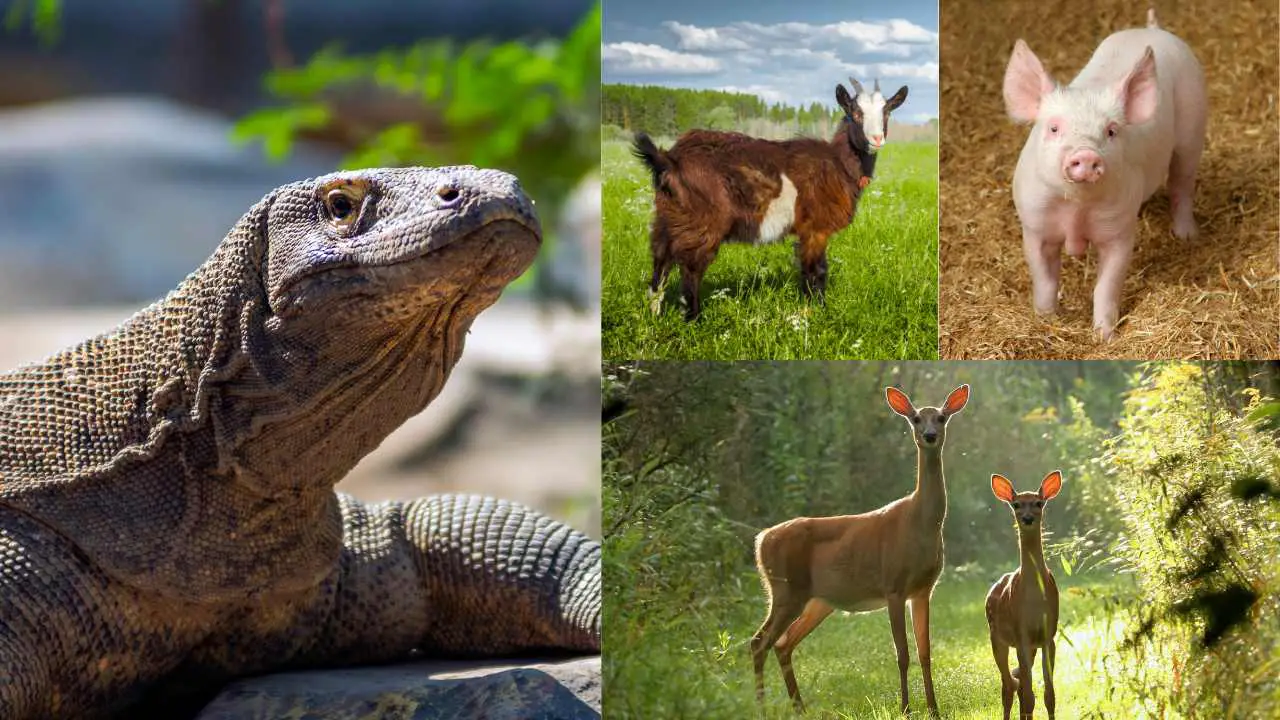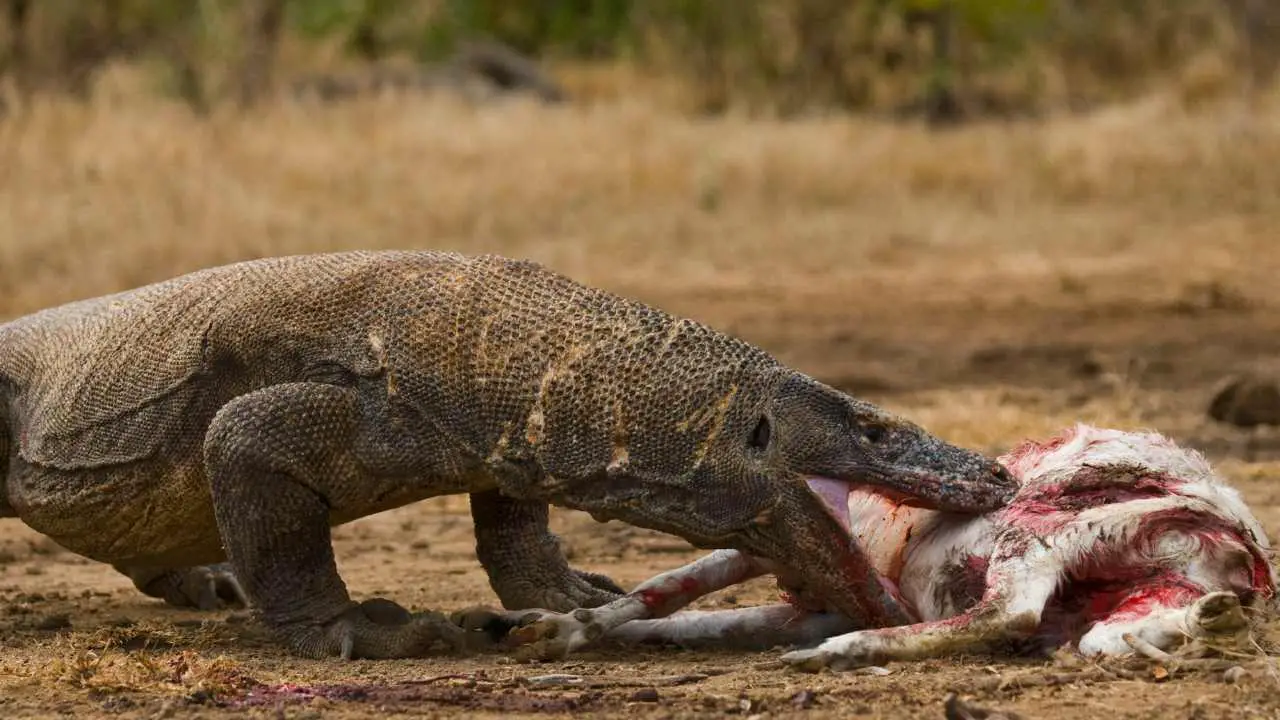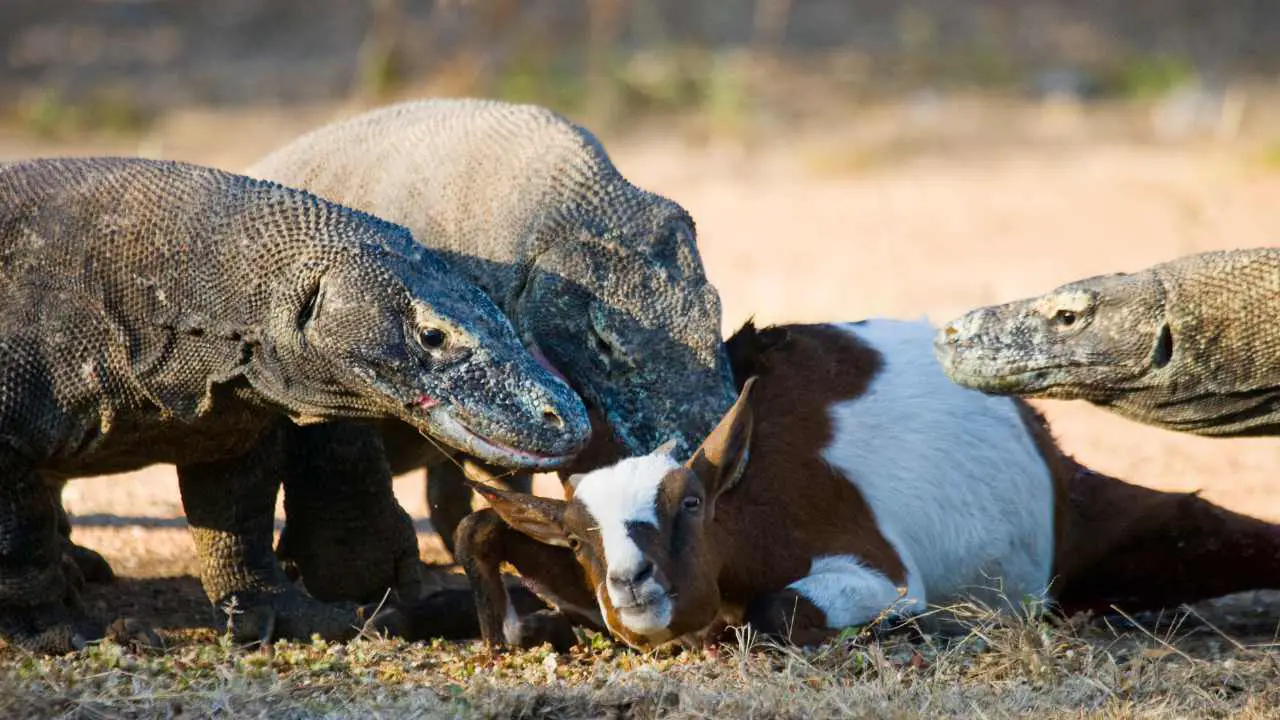Komodo dragons are the world’s largest living lizards and are formidable carnivorous predators These remarkable reptiles are known for their massive size and distinctive appearance, but their diet sets them apart in the animal kingdom. Komodo dragons are apex predators, with a diverse diet that includes both carrion and live prey. Their carnivorous diet and hunting skill are what makes them so fascinating.
What do Komodo dragons eat?

Komodo dragons are carnivores and their diet primarily consists of meat they can eat almost anything, and their diet includes a wide range of prey, such as:
- Deer
- Pigs
- Goats
- Carrion
Their scavenging behavior allows them to consume a variety of animals, including those who are dead, and their powerful jaws and venomous bite help them hunt and digest their prey.
How much do Komodo dragons eat?

Komodo dragons can devour around 120 to 200 pounds of food. The amount a Komodo dragon eats can vary, but on average, they consume about 80% of their body weight in a single meal. However, Komodo dragons don’t eat every day, they may have several weeks or even months between meals, depending on the size of their previous feast. Their ability to consume such large quantities at once is due to their flexible stomachs and efficient digestion.
Do Komodo dragons eat full animals?

Yes, komodo dragons eat full animals. They can consume entire prey animals, including large mammals like deer and water buffalo, as well as smaller animals like birds, and reptiles. It takes them 15 to 20 minutes to do so.
Additionally, they are known to scavenge on the carcasses of animals that have already died, so they may eat the entire body of these animals as well. Sometimes a dragon will ram the carcass against a tree to help push it down its throat and the force the dragon uses is so powerful that the tree sometimes falls.
Do Komodo dragons eat eggs?
Yes, komodo dragons do eat eggs along with other prey. To provide a balanced diet in captivity, including small mammals, birds, insects, and carrion. This variety ensures they receive essential nutrients for their well-being. They are opportunistic feeders and will consume the eggs of various animals when they come across them.
This includes the eggs of birds and reptiles. Komodo dragons have been observed raiding nests of ground-nesting birds and reptiles to feed on the eggs. Their keen sense of smell helps them locate these nests, and they use their sharp claws and powerful jaws to break open the eggs and consume the contents.
Do Komodo dragons eat crocodiles?
Crocodiles are not a regular part of Komodo dragons’ diet, but they are more commonly associated with hunting mammals and scavenging carcasses
Komodo dragons are opportunistic predators and have been known to attack and eat small crocodiles. While they feed on mammals, birds, and other smaller animals, if the opportunity arises, they may prey on young and small crocodiles.
Do Komodo dragons eat dogs?
Komodo dragons can eat dogs if they come across them, but it’s not their primary food. However, they typically prefer wild prey such as deer, pigs, and other mammals.
Can a Komodo dragon catch a human?
Komodo dragons don’t usually hunt humans. While they have been known to bite or attack humans in rare instances, it is usually not because they see humans as prey but rather as a result of other factors, such as feeling threatened or provoked. However, because they are powerful and potentially dangerous animals, it is essential to exercise caution and maintain a safe distance while encountering them in the wild.
Do Komodo dragons eat their prey whole?
Yes, komodo dragons eat their prey whole. They have powerful jaws and sharp teeth that allow them to tear into their prey and consume it in large chunks. They can devour animals such as deer, wild boar, and birds. They ingest them whole or in large portions. Their effective digestive systems help them process the entire prey, including bones and other parts.
Do Komodo dragons eat snakes?
Yes, komodo dragons do eat snakes. They have a varied diet that includes a range of animals, and snakes can be a part of their diet. While snakes may not be a primary food source for Komodo dragons, they are part of the reptiles and smaller animals that make up their diet.
Which animal eats Komodo?
In the wild, komodo dragons are apex predators, which means they are at the top of the food chain and have very few natural predators. The main threat to them is often other, larger Komodo dragons, particularly to younger individuals.
Do Komodo dragons eat each other?
Yes, Komodo dragons do cannibalize each other, particularly younger ones. Komodo dragons are apex predators in their natural habitat, and they can be quite aggressive and territorial. When there is limited prey available, or when Komodo dragons venture into the territory of larger, cannibalism may occur
Do Komodo dragons eat their babies?
Yes, komodo dragons have been known to eat their offspring. This can happen when food is scarce or when young Komodo dragons are near their parents or other adults. In such situations, the adults may see the young as potential sources of food.
Do Komodo dragons eat plants?
Komodo dragons are not herbivores, while there have been some observations of them consuming some plant material, such as fruit and vegetation, this makes up a very small portion of their diet. Their primary source of nutrition comes from animal protein, and they have adaptations for hunting and consuming meat.
Does The Komodo Dragon’s Diet Change By Season?
The Komodo dragon’s diet doesn’t change significantly with the seasons. They are opportunistic predators and mainly feed on a variety of animals, including deer, wild boar, and smaller mammals, as well as carrion. This diet remains relatively consistent throughout the year.
How Does Their Diet Impact Other Species?
Komodo dragons are apex predators in their habitat. Their predation can help control the populations of prey species such as deer, and wild boar. Komodo dragons are also scavengers, feeding on carrion. Their scavenging activities help clean up the environment by consuming and recycling decaying carcasses, which can benefit other scavengers and prevent the spread of disease. Their diet plays an important role in maintaining the balance of their ecosystem.


Leave a Reply